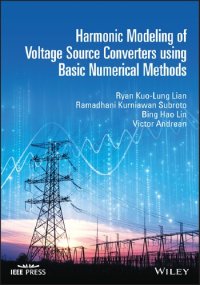
Ebook: Harmonic Modeling of Voltage Source Converters using Basic Numerical Methods
- Series: IEEE Press
- Year: 2021
- Publisher: Wiley-IEEE Press
- Edition: 1
- Language: English
- pdf
One of the first books to bridge the gap between frequency domain and time-domain methods of steady-state modeling of power electronic converters
Harmonic Modeling of Voltage Source Converters using Basic Numerical Methods presents detailed coverage of steady-state modeling of power electronic devices (PEDs). This authoritative resource describes both large-signal and small-signal modeling of power converters and how some of the simple and commonly used numerical methods can be applied for harmonic analysis and modeling of power converter systems. The book covers a variety of power converters including DC-DC converters, diode bridge rectifiers (AC-DC), and voltage source converters (DC-AC).
The authors provide in-depth guidance on modeling and simulating power converter systems. Detailed chapters contain relevant theory, practical examples, clear illustrations, sample Python and MATLAB codes, and validation enabling readers to build their own harmonic models for various PEDs and integrate them with existing power flow programs such as OpenDss.
This book:
- Presents comprehensive large-signal and small-signal harmonic modeling of voltage source converters with various topologies
- Describes how to use accurate steady-state models of PEDs to predict how device harmonics will interact with the rest of the power system
- Explains the definitions of harmonics, power quality indices, and steady-state analysis of power systems
- Covers generalized steady-state modeling techniques, and accelerated methods for closed-loop converters
- Shows how the presented models can be combined with neural networks for power system parameter estimations
Harmonic Modeling of Voltage Source Converters using Basic Numerical Methods is an indispensable reference and guide for researchers and graduate students involved in power quality and harmonic analysis, power engineers working in the field of harmonic power flow, developers of power simulation software, and academics and power industry professionals wanting to learn about harmonic modeling on power converters.